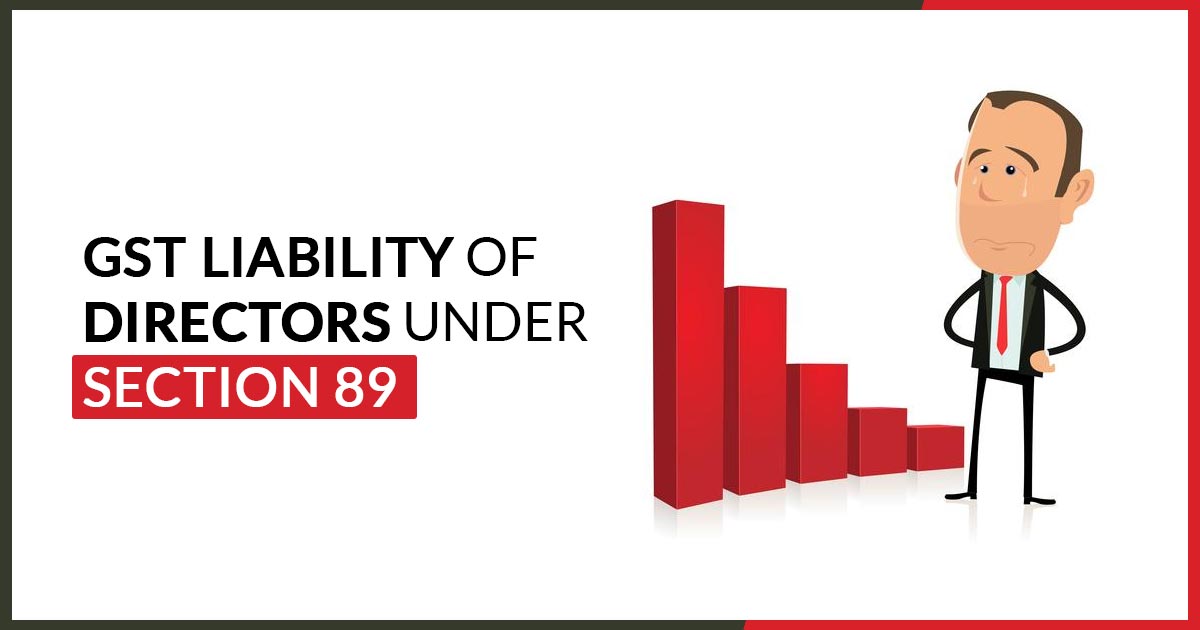
Historically, tax authorities have faced challenges in recovering overdue taxes from defaulters. These difficulties are exacerbated when a company declares bankruptcy, becomes financially insolvent or becomes untraceable. It’s essential to consider that in the context of GST, the funds owed to the government by a company may have already been collected from the end consumer.
Consequently, there should be no exemption from legal consequences for any significant negligence or wrongdoing regarding the company’s financial matters.
What GST Section 89 Says?
Section 89 of the Central Goods and Services Tax Act, 2017 addresses the joint and several personal liabilities of Directors in a Private Company when tax, interest, or penalties cannot be retrieved. Under this provision, Directors must demonstrate that they are not responsible for the company’s tax defaults.
Important: Summary of Latest GST Changes Effective from 1st Oct
Furthermore, Section 89 includes a non-observant clause, which means that its regulations override any provisions in the Companies Act. Consequently, in the context of GST recovery, the concept of a corporation as a distinct legal entity, as outlined in the Companies Act, is significantly diminished.
Who is Responsible as per GST Law?
According to GST laws, the responsibility for recovering taxes is generally assigned to the entity making taxable supplies. Therefore, this liability should, in principle, be imposed on the entire company rather than on an individual based solely on their position as a Director, unless proven otherwise.
It is worth noting that there is no other provision that imposes liability on a Director regarding the tax obligations of a public company. In the absence of such a provision, can it be asserted that Directors bear no automatic responsibility for recovering the tax debts of a public company under GST laws?
Also Read: Simplify GST Liability on Director’s Remuneration Under RCM
It can reasonably be argued that any action taken by the Department to assign liability to a Director for recovering the debts of a public company would potentially violate the Constitution of India. Numerous legal judgments have emphasized that Directors cannot be held accountable for a company’s statutory dues in the absence of an explicit statutory provision and have underscored the principle of a company’s distinct legal existence.
However, in specific exceptional circumstances, the principle of a company’s distinct legal existence can be set aside through the application of the concept that the corporate veil may be lifted in certain tax cases involving evasion or fraud, as recognized by the courts over time.
The common law doctrine of piercing the corporate veil can be employed when a company attempts to evade its tax obligations under a statute. The esteemed Supreme Court has noted that the courts have the authority to disregard the corporate entity when it is utilized for tax evasion or to circumvent tax responsibilities.
GST Section 132 for Penalties
It’s important to highlight that Section 132 outlines penalties for various offences under GST, including situations where an individual collects tax but fails to remit it to the Government. Does this provide a loophole for the Department to potentially hold Directors accountable for the company’s defaults and subsequently penalize them?
In the authors’ view, this provision should not be exploited by the Department. If the Department does attempt to hold Directors liable for penalties under this provision, it becomes a question of whether the Directors can successfully defend themselves in tax recovery proceedings, especially when they were not involved in any of the offences.
Closure: In the absence of a specific statutory provision, Directors of a public company cannot be automatically held responsible. However, under certain exceptional circumstances, tax arrears of a company can be attributed to Directors if it can be demonstrated that they were responsible for the company’s operations and the non-payment of government dues.
The presence of certain indirect provisions to hold individuals accountable for offences should not be misused by the Department, as it could place Directors in a challenging position, requiring them to prove their innocence and lack of involvement in any wrongdoing.